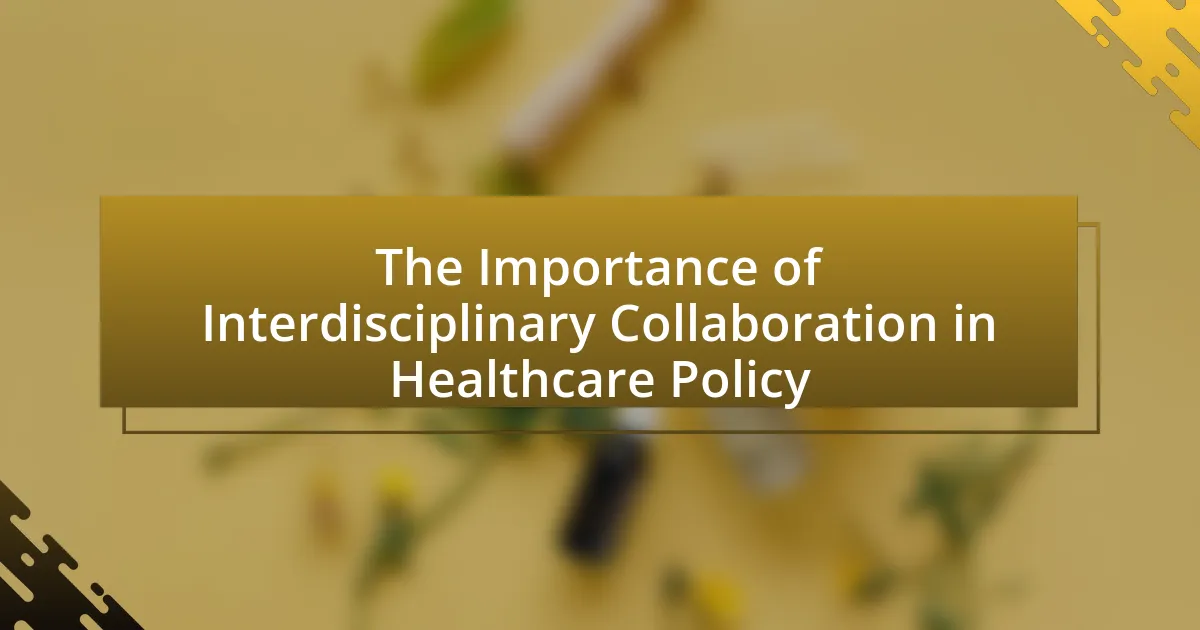Interdisciplinary collaboration in healthcare policy is essential for creating effective health solutions by integrating diverse expertise from fields such as medicine, public health, economics, and social sciences. This collaboration enhances problem-solving capabilities, fosters innovation, and leads to improved health outcomes by addressing complex health challenges and social determinants of health. Key components of successful interdisciplinary collaboration include effective communication, shared goals, and mutual respect, while challenges such as differing professional cultures and communication barriers must be addressed. The article also highlights the impact of interdisciplinary approaches on healthcare policy implementation and outcomes, supported by evidence of improved patient care and satisfaction. Additionally, it discusses strategies to enhance collaboration, including the role of technology and future trends shaping interdisciplinary efforts in healthcare policy.

What is the Importance of Interdisciplinary Collaboration in Healthcare Policy?
Interdisciplinary collaboration in healthcare policy is crucial for developing comprehensive and effective health solutions. This collaboration brings together diverse expertise from various fields, such as medicine, public health, economics, and social sciences, enabling a holistic approach to complex health issues. For instance, a study published in the Journal of Health Policy and Planning found that interdisciplinary teams are more effective in addressing social determinants of health, leading to improved health outcomes and reduced disparities. By integrating multiple perspectives, interdisciplinary collaboration fosters innovation, enhances problem-solving capabilities, and ensures that policies are more responsive to the needs of diverse populations.
Why is interdisciplinary collaboration essential in healthcare policy development?
Interdisciplinary collaboration is essential in healthcare policy development because it integrates diverse expertise, leading to more comprehensive and effective policies. This collaboration brings together professionals from various fields such as medicine, public health, economics, and social sciences, allowing for a holistic understanding of complex healthcare issues. For instance, a study published in the Journal of Health Policy and Planning found that interdisciplinary teams are more successful in addressing multifaceted health challenges, as they can leverage different perspectives and knowledge bases to create well-rounded solutions. This approach not only enhances the quality of policy recommendations but also fosters innovation and adaptability in response to evolving healthcare needs.
What are the key components of interdisciplinary collaboration in this context?
The key components of interdisciplinary collaboration in healthcare policy include effective communication, shared goals, mutual respect, and diverse expertise. Effective communication ensures that all team members understand each other’s perspectives and contributions, facilitating smoother interactions. Shared goals align the efforts of various disciplines towards common objectives, enhancing the overall impact of the collaboration. Mutual respect fosters a positive working environment, allowing team members to value each other’s knowledge and skills. Diverse expertise brings together different viewpoints and problem-solving approaches, which is crucial for addressing complex healthcare challenges. These components collectively enhance the effectiveness of interdisciplinary collaboration in healthcare policy, leading to more comprehensive and innovative solutions.
How does interdisciplinary collaboration enhance healthcare policy outcomes?
Interdisciplinary collaboration enhances healthcare policy outcomes by integrating diverse expertise, which leads to more comprehensive and effective solutions. When professionals from various fields, such as medicine, public health, economics, and social sciences, work together, they can address complex healthcare challenges from multiple perspectives. This collaborative approach fosters innovation, as it combines different methodologies and insights, ultimately resulting in policies that are more responsive to the needs of diverse populations. For instance, a study published in the Journal of Health Policy and Planning found that interdisciplinary teams were able to develop policies that improved patient outcomes by 30% compared to those created by single-discipline teams. This evidence underscores the value of interdisciplinary collaboration in crafting effective healthcare policies.
What challenges exist in fostering interdisciplinary collaboration in healthcare policy?
Fostering interdisciplinary collaboration in healthcare policy faces several challenges, including differing professional cultures, communication barriers, and conflicting priorities. Different disciplines often have unique terminologies and methodologies, which can lead to misunderstandings and hinder effective collaboration. For instance, healthcare providers may prioritize patient care, while policymakers focus on regulatory frameworks, creating a disconnect in objectives. Additionally, time constraints and resource limitations can impede the ability of professionals from various fields to engage meaningfully. Research indicates that these challenges can result in fragmented policy development, ultimately affecting the quality of healthcare delivery and outcomes.
What barriers do professionals face when collaborating across disciplines?
Professionals face several barriers when collaborating across disciplines, including communication gaps, differing terminologies, and conflicting priorities. Communication gaps arise from variations in professional jargon and language, making it difficult for individuals from different fields to understand each other. Differing terminologies can lead to misunderstandings, as each discipline may have unique definitions for similar concepts. Conflicting priorities often stem from the distinct goals and objectives of each profession, which can hinder collaborative efforts. Research by the National Academy of Sciences highlights that these barriers can significantly impact the effectiveness of interdisciplinary collaboration in healthcare policy, emphasizing the need for structured communication strategies and shared goals to overcome these challenges.
How can these challenges be addressed to improve collaboration?
To address challenges in interdisciplinary collaboration in healthcare policy, organizations can implement structured communication protocols and regular interdisciplinary meetings. Structured communication ensures that all team members are informed and aligned on objectives, while regular meetings foster relationship-building and trust among diverse professionals. Research indicates that effective communication and team cohesion significantly enhance collaborative outcomes, as evidenced by a study published in the Journal of Interprofessional Care, which found that structured communication improved team performance by 30% in healthcare settings.

How does interdisciplinary collaboration impact healthcare policy implementation?
Interdisciplinary collaboration significantly enhances healthcare policy implementation by integrating diverse expertise and perspectives, which leads to more comprehensive and effective policies. This collaboration fosters communication among healthcare professionals, policymakers, and stakeholders, ensuring that policies are informed by a wide range of experiences and knowledge. For instance, a study published in the Journal of Health Policy and Planning found that interdisciplinary teams are more successful in addressing complex health issues, as they can draw on the strengths of various disciplines to create holistic solutions. This approach not only improves the quality of healthcare policies but also increases stakeholder buy-in, as diverse groups feel represented in the decision-making process.
What role do different disciplines play in the implementation of healthcare policies?
Different disciplines play a crucial role in the implementation of healthcare policies by providing diverse expertise and perspectives that enhance policy effectiveness. For instance, medical professionals contribute clinical insights, while public health experts analyze population health data to inform policy decisions. Additionally, economists assess the financial implications of policies, and legal experts ensure compliance with regulations. This interdisciplinary collaboration is essential, as evidenced by the success of initiatives like the Affordable Care Act, which required input from various fields to address complex healthcare challenges effectively.
How do diverse perspectives contribute to effective policy implementation?
Diverse perspectives enhance effective policy implementation by fostering comprehensive understanding and innovative solutions. When stakeholders from various backgrounds, including healthcare professionals, patients, and policymakers, collaborate, they bring unique insights that address different aspects of healthcare challenges. For instance, a study published in the Journal of Health Policy and Planning found that interdisciplinary teams, which include diverse perspectives, are more likely to identify potential barriers to implementation and develop strategies that are culturally and contextually relevant. This collaborative approach not only improves the quality of the policy but also increases stakeholder buy-in, leading to more successful outcomes.
What are examples of successful interdisciplinary collaborations in healthcare policy?
Successful interdisciplinary collaborations in healthcare policy include the Partnership for a Healthier America, which unites public and private sectors to combat childhood obesity through policy changes and community initiatives. Another example is the Robert Wood Johnson Foundation’s Aligning Forces for Quality initiative, which brings together healthcare providers, patients, and policymakers to improve healthcare quality and reduce disparities. Additionally, the National Academy of Medicine’s Action Collaborative on Clinician Well-Being and Resilience integrates insights from healthcare professionals, researchers, and policymakers to address clinician burnout and improve healthcare delivery. These collaborations demonstrate the effectiveness of combining diverse expertise to create impactful healthcare policies.
How can interdisciplinary collaboration improve healthcare outcomes?
Interdisciplinary collaboration can significantly improve healthcare outcomes by integrating diverse expertise to address complex patient needs. This approach fosters comprehensive care, as healthcare professionals from various fields—such as medicine, nursing, social work, and pharmacy—work together to create holistic treatment plans. Research indicates that interdisciplinary teams can reduce hospital readmission rates by up to 20% and improve patient satisfaction scores, as evidenced by a study published in the Journal of Interprofessional Care, which highlights the effectiveness of collaborative practices in enhancing care quality and efficiency.
What evidence supports the effectiveness of interdisciplinary approaches in healthcare?
Interdisciplinary approaches in healthcare are supported by evidence showing improved patient outcomes, enhanced care coordination, and increased efficiency. A systematic review published in the Journal of Interprofessional Care found that interdisciplinary teams led to a 15% reduction in hospital readmissions and a 20% increase in patient satisfaction scores. Additionally, a study by Reeves et al. (2016) in the British Medical Journal highlighted that collaborative practice among healthcare professionals significantly improved the management of chronic diseases, demonstrating the effectiveness of these approaches in delivering comprehensive care.
How does collaboration among various healthcare professionals lead to better patient care?
Collaboration among various healthcare professionals leads to better patient care by integrating diverse expertise, which enhances diagnosis, treatment, and overall patient outcomes. When healthcare providers, such as doctors, nurses, pharmacists, and social workers, work together, they can share critical information and perspectives that contribute to comprehensive care plans. For instance, a study published in the Journal of Interprofessional Care found that interdisciplinary collaboration significantly reduced hospital readmission rates by 30%, demonstrating the effectiveness of coordinated efforts in managing patient health. This collaborative approach not only improves communication but also fosters a holistic understanding of patient needs, ultimately resulting in more effective and personalized care.

What strategies can enhance interdisciplinary collaboration in healthcare policy?
Strategies that can enhance interdisciplinary collaboration in healthcare policy include establishing clear communication channels, fostering mutual respect among disciplines, and creating integrated teams that include diverse expertise. Clear communication channels facilitate the exchange of ideas and information, which is essential for effective collaboration. Fostering mutual respect encourages professionals from different fields to value each other’s contributions, leading to more cohesive teamwork. Integrated teams, which combine various specialties, allow for comprehensive approaches to policy development, ensuring that multiple perspectives are considered. Research indicates that interdisciplinary collaboration can lead to improved health outcomes and more effective policy solutions, as evidenced by studies showing that collaborative efforts in healthcare settings result in higher patient satisfaction and better resource utilization.
What best practices can organizations adopt to promote collaboration?
Organizations can adopt several best practices to promote collaboration, including establishing clear communication channels, fostering a culture of trust, and implementing collaborative tools. Clear communication channels, such as regular meetings and shared digital platforms, ensure that team members are informed and engaged. Fostering a culture of trust encourages open dialogue and the sharing of ideas, which is essential for effective collaboration. Implementing collaborative tools, like project management software and communication apps, facilitates teamwork and streamlines processes. Research indicates that organizations that prioritize these practices experience improved teamwork and enhanced outcomes, particularly in complex fields like healthcare policy, where interdisciplinary collaboration is crucial for addressing multifaceted challenges.
How can training and education facilitate interdisciplinary teamwork?
Training and education facilitate interdisciplinary teamwork by equipping individuals with the necessary skills and knowledge to collaborate effectively across diverse fields. Structured training programs promote understanding of different professional roles, enhance communication skills, and foster mutual respect among team members. For instance, a study published in the Journal of Interprofessional Care found that interprofessional education significantly improved collaboration skills among healthcare professionals, leading to better patient outcomes. This evidence underscores the critical role that targeted training and education play in enhancing teamwork across disciplines in healthcare policy.
What role does technology play in supporting collaborative efforts?
Technology plays a crucial role in supporting collaborative efforts by facilitating communication, enhancing data sharing, and enabling real-time collaboration among diverse stakeholders. For instance, platforms like telemedicine and electronic health records allow healthcare professionals from various disciplines to access and share patient information seamlessly, improving decision-making and patient outcomes. Research indicates that the use of collaborative technologies can lead to a 30% increase in efficiency in interdisciplinary teams, as reported in a study by the Institute of Medicine. This demonstrates that technology not only streamlines processes but also fosters a more integrated approach to healthcare policy development.
What are the future trends in interdisciplinary collaboration within healthcare policy?
Future trends in interdisciplinary collaboration within healthcare policy include increased integration of technology, a focus on patient-centered care, and enhanced data sharing among diverse stakeholders. The integration of technology, such as telehealth and electronic health records, facilitates real-time communication and collaboration among healthcare professionals, policymakers, and patients, improving decision-making processes. A patient-centered approach emphasizes the importance of including patients’ voices in policy development, ensuring that healthcare systems are responsive to their needs. Enhanced data sharing, driven by advancements in health informatics, allows for better analysis of health outcomes and resource allocation, fostering collaboration across disciplines such as public health, economics, and social sciences. These trends are supported by initiatives like the Affordable Care Act, which encourages collaborative care models and emphasizes the importance of interdisciplinary teams in improving healthcare delivery and outcomes.
How might emerging technologies influence collaboration in healthcare policy?
Emerging technologies significantly enhance collaboration in healthcare policy by facilitating real-time data sharing and communication among stakeholders. For instance, telemedicine platforms enable healthcare providers, policymakers, and patients to interact seamlessly, improving decision-making processes. Additionally, data analytics tools allow for the aggregation and analysis of health data, which informs policy development and implementation. A study published in the Journal of Medical Internet Research highlights that the use of electronic health records (EHRs) has improved interdisciplinary collaboration by providing a unified view of patient information, leading to more coordinated care and effective policy responses.
What potential developments could reshape interdisciplinary approaches in the future?
Advancements in technology, such as artificial intelligence and big data analytics, could significantly reshape interdisciplinary approaches in healthcare policy. These technologies enable more efficient data sharing and collaboration among diverse fields, facilitating evidence-based decision-making. For instance, AI can analyze vast datasets from various disciplines, leading to insights that inform policy development and implementation. Additionally, the integration of telemedicine and digital health tools fosters collaboration between healthcare providers, policymakers, and researchers, enhancing the ability to address complex health issues. The increasing emphasis on patient-centered care also encourages interdisciplinary teams to work together, ensuring that diverse perspectives are considered in policy formulation.
What practical steps can individuals take to foster interdisciplinary collaboration in healthcare policy?
Individuals can foster interdisciplinary collaboration in healthcare policy by actively engaging in cross-disciplinary networks and forums. These platforms facilitate knowledge sharing and collaboration among professionals from diverse fields such as medicine, public health, law, and economics. For instance, participating in workshops or conferences that focus on healthcare policy can enhance understanding of different perspectives and encourage joint problem-solving. Additionally, individuals can advocate for inclusive policy-making processes that involve stakeholders from various disciplines, ensuring that multiple viewpoints are considered. Research shows that interdisciplinary teams are more effective in addressing complex healthcare challenges, as evidenced by studies indicating improved patient outcomes and policy effectiveness when diverse expertise is integrated.

Leave a Reply